外研版英语(新标准)九年级下册教案(全册)
外研版(新标准)英语九年级下册教案(全册)
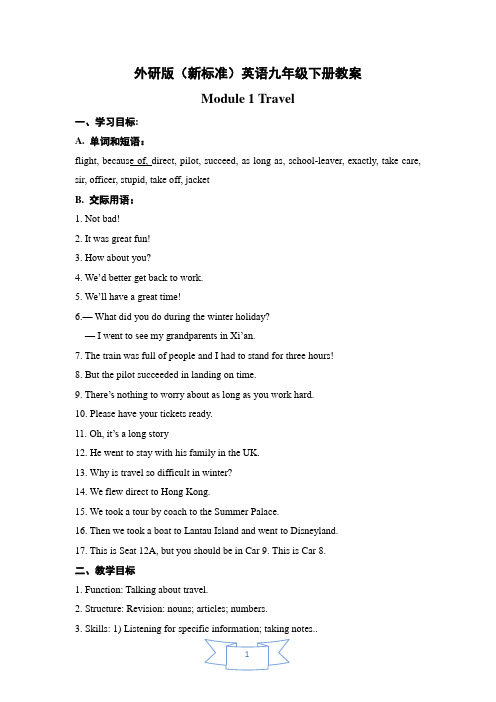
外研版(新标准)英语九年级下册教案Module 1 Travel一、学习目标:A. 单词和短语:flight, because of, direct, pilot, succeed, as long as, school-leaver, exactly, take care, sir, officer, stupid, take off, jacketB. 交际用语:1. Not bad!2. It was great fun!3. How about you?4. We’d better get back to work.5. We’ll have a great time!6.— What did you do during the winter holiday?—I went to see my grandparents in Xi’an.7. The train was full of people and I had to stand for three hours!8. But the pilot succeeded in landing on time.9. There’s nothing to worry about as long as you work hard.10. Please have your tickets ready.11. Oh, it’s a long story12. He went to stay with his family in the UK.13. Why is travel so difficult in winter?14. We flew direct to Hong Kong.15. We took a tour by coach to the Summer Palace.16. Then we took a boat to Lantau Island and went to Disneyland.17. This is Seat 12A, but you should be in Car 9. This is Car 8.二、教学目标1. Function: Talking about travel.2. Structure: Revision: nouns; articles; numbers.3. Skills: 1) Listening for specific information; taking notes..2) Talking about familiar topics (holidays)3) Predicting; reading for specific information .4) Writing a short play about a trip.4. Around the world: The first pilot to fly alone across the Atlantic Ocean.5. Task: Writing and acting out a short play.三、重点及难点:Grammar: Revision: nouns; articles; numbers.四、教学设计:Unit 1 We toured the city by bus and by taxi.Ⅰ Teaching modelListening and speakingⅡ Teaching methodCommunicative approachⅢ Teaching aims1. To understand the conversations conversation with regard to “travel”.2. To talk about one’s holiday and new term..Ⅳ Teaching Objectives1. Key vocabulary: flight, because of, direct, pilot, succeed, as long as, school-leaver,exactly2. Key structures: Sentence structureⅤ Teaching aidsTape recorder, OHP, videoⅥ Teaching StepsStep 1 Warming up1. Show some pictures to talk.1) — How do you go to school / work?— I go to school by ______.2) — How do you most like to travel by?— I most like to travel by _________.3. Show some pictures to introduce the new words.4. Learn the new words.5. Read the words after the teacher.Step 2 Complete the sentences.1. Ask the students to read through the sentences in Activity 1.1) I most like to travel by _____________.2) I least like to travel by _____________.3) I travel most often by ______________.4) I travel least often by ______________.2. Complete the sentences so they are true for you.3. Ask the students to check their answer with a partner.4. Call back the answers from the whole class and check the answers.Step 3 Listening practice.1. Ask the students to read through the sentences in Activity2.1) The flight takes about __________ hours.2) Time difference: __________ hours.3) Flight number: __________4) From _________ to _________5) Leave at (new time): _________6) Arrive at (new time): _________Keys: 10, 8, CA938, London, Beijing, 11:30, 5:30 p.m.2. Play the tape and ask the students to listen to the tape carefully.3. Listen and complete the notes.4. Ask the students to check their answer with a partner.5. Call back the answers from the whole class and check the answers.Step 4 Listen and read.1. Ask the students to listen and read the conversation silently.When you listen to the recording, try to note down the key information. Your notes will then help you retell the main information.2. Now complete the table.Holiday activitiesLingling went to see her grandparents in Henan Province by trainTonyDamingBetty4. Ask the students to check their answer with a partner.5. Call back the answers from the whole class and check the answers.Keys:went to stay with his family in the UK by plane.flew to Hong Kong and visited Lantau Island Disneyland.toured Beij ing by bus and by taxi and took a tour by coach to the Summer Palace. Step 5 Answer the questions.1. Ask the students to read through the questions in Activity 4.1) When do you think the conversation takes place?2) According to Lingling, why is travel so difficult in winter?3) What are Daming and Betty looking forward to at the end of the term?2. Answer the questions.3. Ask the students to check their answer with a partner.4. Call back the answers from the whole class and check the answers.Keys:1. The conversation takes place in winter.2. Travel is difficult because of the Spring Festival.3. They are looking forward to the school-leavers’ party.Step 6 Choose the correct answer.1. Ask the students to read through the words in the box in Activity 5.direct exactly pilot succeed2. Choose the correct answer.1. When you fly direct, you ______.a) arrive without stopping at another place2. When you say “Exactly”, it means ______.a) you do not agreeb) you completely agree3. The pilot of plane ______.a) flies itb) gives you food and drink during the flight4. If you succeed in doing something, you ______.a) manage to do itb) nearly do it3. Ask the students to check their answer with a partner.4. Call back the answers from the whole class and check the answers.Keys: 1. a 2. b 3. a 4. aStep 7 Everyday EnglishNot bad!It was great fun!How about you?We’d better get back to work.We’ll have a great time!Step 8 Pronunciation and speaking: Listen and mark the pauses.1. Play the recording once without stopping.2. Play the recording again and ask the whole class to repeat.Lingling: How about you, Betty?Betty: We had quit a good time in Beijing. We toured the city by bus and by taxi. Last weekend, we took a tour by coach to the Summer Place and went for a long walk around the lake.Lingling: That soun ds great! But now, we’d better get back to work . We’re going to have a big exam at the end of the term.3. Ask the students to listen and mark the pauses.4. Now listen again and repeat.Step 9 Work in groups.Talk about your winter holiday.1. Ask and answer about what you did during the winter holiday.— What did you do during the winter holiday?— I went to see my grandparents in Xi’an.2. Talk about what happened during the trip.The train was full of people and I had to stand for three hours!Step 10 Language points1. But the pilot succeeded in landing on time. 不过飞行员成功地按时着陆了。
外研版九年级下全册教案

外研版九年级下全册教案TTA standardization office【TTA 5AB- TTAK 08- TTA 2C】课时备课表(教案)Module2 EducationModule 2课时备课(教案)Module2课时备课表(教案)Module 2 课时备课表(教案)Module2 课时备课表(教案)序Module 2课时备课表(教案)Module 3 Now and then序课时备课表(教案)序课时备课表(教案)序课时备课表(教案)序课时备课表(教案)Module4Module 4课时备课(教案)Module 4课时备课表(教案)Module4 课时备课表(教案)Module4 课时备课表(教案)序Module 4课时备课表(教案)Module 5 Rules and suggestionsUnit 1 You must keep to the path.Teaching aims and demands:1.To enable the students to listen carefully and understand the dialogue2.To enable the students to master the useful expressions and everyday English. Important points and difficult points: Listening and speakingTeaching method:1. Discussion in groups2.To create an active and relax atmosphere for English learningTeaching aids: Tape recorder, some pictures, computer if possibleStep1 Warming-up: Look at the photo, and say what rules and advice you can give to visitors to the Great Wall. Have you ever been to the Great Wall/ What can we pay attention to/ What rules should we obeyStep 2 Sharing-task 1: Listen and read1. Book close! Listen to the tape and fill in the blank:Everyone, listen up! Before we can __________ ourselves on the Great Wall, there are a few _________ and suggestions. First, you must keep to the path. You _______ walk along the edge. Second, you have to keep together, or you might get lost. Third, when you go rock climbing, you must use ________. You have to think about personal________.2. Listen again, and check in groups : keys: enjoy, rules, mustn’t, ropes, safety3. Open the book and ask the students to practice the dialogue in pairs or in groups.Step 3 Sharing-task 2 : complete the exercise in activity 4, then discuss in groups. (keys: b, c, a , c, a )Step 4 sharing–task 3: read silently again and finish activity 5 in groups.Step 5 sharing-task 4: answer the questions in activity 6.Step 6 Language points:1. listen up2. a few3. keep to the path4. go off on your own5. get lost6. I’m starving.7. start doing doing / to dostop from doing9. think about10. take a look across11. lead the way12. I think that’s all.13. feel tiredStep 5 Sharing-task 5: Pronunciation and speaking. Ask the students to look at the sentence and listen. Then say the sentence aloud in group.Step 7 Homework1.Finish the exercises in exercise book2.Try to recite the dialogue3.Get familiar with the new wordsUnit 2 You mustn’t move.Teaching aims and demands:1.To enable the students to master the useful expressions2.To enable the students to improve their reading comprehension.Important points and difficult points: Reading comprehensionTeaching method1. Discussion in groupTeaching aids: Multimedia if possible, tape recorderStep 1 Revision1.Have a dictation and check homework.2.Make sentences with the useful expressions.Step 2 Sharing-task 1: ask the students to look at the picture and answer the questions in groups.Step 3 Sharing-task 2: Complete the passage with the given first letter.On our first day trip, all of us felt t_____1______ and soon fell asleep at night. In the mid-night, there was a strange n___2____ outside. I went out, but there was n____3____. In the morning, we f___4____ the bag of food was open. We thought there were bears. We d____5____ to hang the food in a tree. During the night the bears c___6_____ back. This time they took the food from the tree. The next day, I went for a walk in the f___7____. Unluckily, I saw a bear. I stood very s____8____. I was so frightened that I didn’t even turn my h___9___. I have never r__10___ so fast, back to my friends.(keys: tired, noise, nothing, found, decided, came, forest, still, head, run)Step 4 Sharing-task 3 Book open.Read the passage silently and finish activity 3. Check answers in groups. (Keys: b, d, d, a, a)Step 5 Sharing-task 4 Read again in details and answer the questions in activity 2. Step 6 Language points1.fall asleep2.in the middle of …3.noise – voice – soundmake lots of noise4.hang … in the tree5.not high enough6.pick up7.from a distance8.tidy up9.above all10.see doing / do11.reach out12.run past13.my blood went cold.Step 7 Sharing-task 5 Summary: write notes about the things you must do if there are bears near.Step 8 Sharing-task 6 Writing: Discuss in group and think of an area of countryside near you. Make notes about it.Step 9 Homework1.Prepare for the words dictation.2.Finish the exercises in the exercise book.Unit 3 Language in useTeaching aims and demands:1.To enable the students to improve their writing.2.To enable the students to use the words and expressions freely.Teaching method: Modal VerbsTeaching aids: Multimedia if possible, tape recorderStep 1 Revision1.Have a dictation,2.Check the exercisesStep 2 Sharing-task 1 Read the sentences in language practice and teach Modal verbsStep 3Sharing-task 21) Work in pairs in activity 1.2) More details in the exercise book(创新学习).Step 4 Do exercises in workbook P112:1)Choose the correct answer(Part 2).2)Rewrite the underlined parts of the sentences.(Part 3)3)Read the rules about gymnastics classes and complete the sentences.(Part 4) Step 5 Around the world: Eco-tourismStep 6 Module task: writing advice for visitors to China.Step 7 Homework1.Finish all the exercises in 创新学习.2.Prepare for a test.Check all the exercises (two periods) Have a test. (one period)教学后记:Module6Module 6课时备课(教案)Module 6课时备课表(教案)Module6 课时备课表(教案)Module6 课时备课表(教案)Module 6课时备课表(教案)外研初三下册MODULE 7 Content:Module 7 Eating together一、题材内容本模块以食物和饮食习惯为话题。
外研社初中英语九年级下册全册教案:Module 3 Life now and then 教案

外研社初中英语重点知识精选掌握知识点,多做练习题,基础知识很重要!外研社版初中英语和你一起共同进步学业有成!Module 3 Life now and then一、学习目标:A. 单词和短语:wealthy, fear, used to, wealth, double, seldom, spare, spare time, speak up, deaf, tiny, electric, light, candle, postman, cold, heat, full-time, role, education, transportB. 交际用语:1. Nearly finished.2. That’s true.3. I suppose…4. — Is life better today than in the past?— Yes, it is. I think it’s because… / No, it isn’t I think…5. Remember to speak up! She’s a bit deaf now.6. …looking after us was more than a full-time job.7. Generally speaking, I think life is better today.8. People are wealthier today, and they live longer than they did in the past.9. But people don’t take as much exercise as they used to.10. More people have cars, and they walk or use their bikes less.11. We eat better and we live longer.二. 教学目标1. Function: T Making comparisons (2)2. Structure: Revision : adjectives and adverbs ( comparative and superlative forms )3. Skills: 1) Listening for specific information ; taking notes2) Expressing views and opinions3) Predicting ;reading for main ideas; summarizing main ideas in notes4) Writing a composition about the advantages and disadvantages of life today4. Around the world: Cars5. Task: Organizing a debate.三、重点及难点:Grammar: Revision : adjectives and adverbs ( comparative and superlative forms )四、教学设计:Unit 1 They sometimes work harder.Ⅰ Teaching modelListening and speakingⅡ Teaching methodCommunicative and interactiveⅢ Teaching aims1. To understand conversations of comparing life in the past and now2. To understand comparative degree and superlative degree3. To learn how to make comparisonsⅣ Teaching Objectives1. Key vocabulary: wealthy, fear, used to, wealth, double, seldom, spare,spare time, speak up, deaf,2. Key structures: Sentence structureⅤ Teaching aidsTape recorder, OHP , videoⅥ Teaching StepsStep 1 Warming up1. Show some pictures to talk.1) Say what life was like in the early 1980s.2) Say what life is like today.2. Introduce new words and expressions.Step 2 Listening practice.1. Ask the students to read through the questions in Activity2.1) What is the history homework?2) What is the question they need to answer?3) What does Betty ask?4) What does Daming ask?2. Play the tape and ask the students to listen to the tape carefully3. Listen and answer the questions.4. Ask the students to check their answer with a partner.5. Call back the answers from the whole class and check the answers. Keys: Write about life in the past and life today.Is life today better than it was in the past?Betty asks if they can write about medicine and pollution.Daming asks if they can write about personal safety.Step 3 Listen and read.1. Ask the students to listen and read the conversation silently.2. Talk about the pictures.3. Everyday EnglishNearly finished.That’s true.I suppose…4. Now choose the correct answer.1. People live longer because ________.a) we know more about medicineb) they do not work as hard as they didc) they take more exercise2. There is less fear of getting ill ________.a) so people live longerb) because people know how to deal with the ordinary diseasesc) so people work harder than before3. People take less exercise because ________.a) they do not need tob) they drive cars insteadc) they do not have cars or bikes4. People work harder today and ________.a) they do not live as long as they didb) they do not usually have enough free timec) they live a healthier life4. Ask the students to check their answer with a partner.5. Call back the answers from the whole class and check the answers. Keys: 1. a 2. b 3. b 4. bStep 4 Complete the questions.1. Ask the students to read through the words and expression in the box in Activity 4.deaf doubled fear spare used to wealth2. Complete the questions with the words or expression in the box.1) What kinds of things do you _________?2) What do you do in your _________ time?3) What can someone not do if they are ________?4) If something is _________, is it more or less?5) Do you think people _________ take more exercise than they do today?6) Do you think people have more ________ today than they used to?3. Ask the students to check their answer with a partner.4. Call back the answers from the whole class and check the answers. Keys: 1. fear 2. spare 3. deaf 4. doubled5. used to6. wealth 5. Now work in pairs. Ask and answer.Step 5 Pronunciation and speaking.1. Play the recording once without stopping.2. Play the recording again and ask the whole class to repeat.3. Read and predict which words the speaker is likely to stress. Some people think life in the past was simpler and healthier than today.More wealth sometimes means less health. When the number of cars is doubled, the pollution is also doubled, or even worse.4. Now listen and check.5. Read the paragraph in Activity 5 aloud.Step 6 Work in pairs.1. Answer the question and give your reasons.— Is life better today than in the past?— Yes, it is. I think it’s because… / No, it isn’t I think… 2. Now say what is better or worse in:education environment healthStep 7 Language points1. Remember to speak up! She’s a bit deaf now.记得说话大点儿声,她现在有点儿耳背了。
外研版英语(新标准)九年级下册《Revision Module B》教学设计
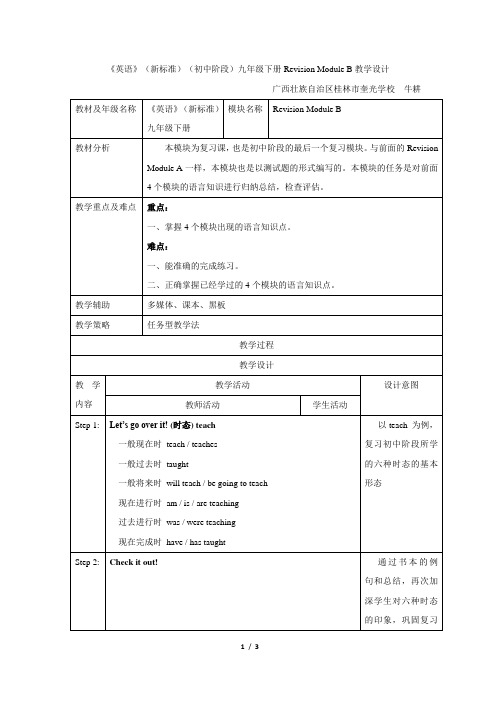
《英语》(新标准)(初中阶段)九年级下册Revision Module B教学设计
广西壮族自治区桂林市奎光学校牛耕
内容。
Step 3: Let’s go over it! (被动语态) write / wrote / written 一般现在时的被动语态
am / is / are written
一般过去时的被动语态
was / were written
一般将来时的被动语态
will be written / be going to be written
以write 为例,复习初中阶段所学的三种时态的被动语态的基本形态。
Step 4: Check it out! 通过书本的例
句和总结,再次加
深学生对三种时态
的被动语态的印
象,巩固复习内容。
Step 5: Let’s go over it! (状语从句)
时间状从when / while / as / before / after / until / as soon as
地点状从where
条件状从if 主将从现
比较状从than/ as
目的状从so that/ in order that
原因状从because/ since/ as
结果状从so...that...
复习初中阶段所学的八种状语从句的连接词及用法,时态。
2019年新外研版九年级下英语全册教案(101页)
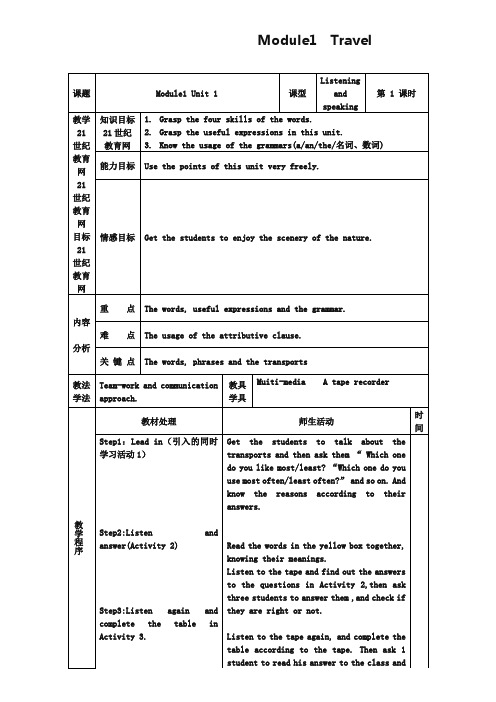
Module1 TravelModule2 EducationModule4Module 5 Rules and suggestionsUnit 1 You must keep to the path.Teaching aims and demands:1.To enable the students to listen carefully and understand the dialogue2.To enable the students to master the useful expressions and everyday English.Important points and difficult points: Listening and speakingTeaching method:1. Discussion in groups2.To create an active and relax atmosphere for English learningTeaching aids: Tape recorder, some pictures, computer if possibleStep1 Warming-up: Look at the photo, and say what rules and advice you can give to visitors to the Great Wall. Have you ever been to the Great Wall? / What can we pay attention to? / What rules should we obey?Step 2 Sharing-task 1: Listen and read1. Book close! Listen to the tape and fill in the blank:Everyone, listen up! Before we can __________ ourselves on the Great Wall, there are a few _________ and suggestions. First, you must keep to the path. You _______ walk along the edge. Second, you have to keep together, or you might get lost. Third, when you go rock climbing, you must use ________.You have to think about personal ________.2. Listen again, and check in groups : keys: enjoy, rules, mustn’t, ropes, safety3. Open the book and ask the students to practice the dialogue in pairs or in groups.Step 3 Sharing-task 2 : complete the exercise in activity 4, then discuss in groups.(keys: b, c, a , c, a )Step 4 sharing–task 3: read silently again and finish activity 5 in groups.Step 5 sharing-task 4: answer the questions in activity 6.Step 6 Language points:1. listen up2. a few3. keep to the path4. go off on your own5. get lost6. I’m starving.7. start doing s.th 8.stop doing s.th / to do s.th stop from doing s.th9. think about10. take a look across11. lead the way12. I think that’s all.13. feel tiredStep 5 Sharing-task 5: Pronunciation and speaking. Ask the students to look at the sentence and listen. Then say the sentence aloud in group.Step 7 Homework1.Finish the exercises in exercise book2.Try to recite the dialogue3.Get familiar with the new wordsUnit 2 You mustn’t move.Teaching aims and demands:1.To enable the students to master the useful expressions2.To enable the students to improve their reading comprehension.Important points and difficult points: Reading comprehensionTeaching method1. Discussion in groupTeaching aids: Multimedia if possible, tape recorderStep 1 Revision1.Have a dictation and check homework.2.Make sentences with the useful expressions.Step 2 Sharing-task 1: ask the students to look at the picture and answer the questions in groups. Step 3 Sharing-task 2: Complete the passage with the given first letter.On our first day trip, all of us felt t_____1______ and soon fell asleep at night. In the mid-night, there was a strange n___2____ outside. I went out, but there was n____3____. In the morning, we f___4____ the bag of food was open. We thought there were bears. We d____5____ to hang the food in a tree. During the night the bears c___6_____ back. This time they took the food from the tree. The next day, I went for a walk in the f___7____. Unluckily, I saw a bear. I stood very s____8____. I was so frightened that I didn’t even turn my h___9___. I have never r__10___ so fast, back to my friends.(keys: tired, noise, nothing, found, decided, came, forest, still, head, run)Step 4 Sharing-task 3 Book open. Read the passage silently and finish activity 3. Check answers in groups. (Keys: b, d, d, a, a)Step 5 Sharing-task 4 Read again in details and answer the questions in activity 2.Step 6 Language points1.fall asleep2.in the middle of …3.noise – voice – soundmake lots of noise4.hang … in the tree5.not high enough6.pick up7.from a distance 8.tidy up9.above all10.see s.b doing / do s.th11.reach out12.run past s.b13.my blood went cold.Step 7 Sharing-task 5 Summary: write notes about the things you must do if there are bears near. Step 8 Sharing-task 6 Writing: Discuss in group and think of an area of countryside near you. Make notes about it.Step 9 Homework1.Prepare for the words dictation.2.Finish the exercises in the exercise book.Unit 3 Language in useTeaching aims and demands:1.To enable the students to improve their writing.2.To enable the students to use the words and expressions freely.Teaching method: Modal VerbsTeaching aids: Multimedia if possible, tape recorderStep 1 Revision1.Have a dictation,2.Check the exercisesStep 2 Sharing-task 1 Read the sentences in language practice and teach Modal verbsStep 3 Sharing-task 21) Work in pairs in activity 1.2) More details in the exercise book(创新学习).Step 4 Do exercises in workbook P112:1)Choose the correct answer(Part 2).2)Rewrite the underlined parts of the sentences.(Part 3)3)Read the rules about gymnastics classes and complete the sentences.(Part 4)Step 5 Around the world: Eco-tourismStep 6 Module task: writing advice for visitors to China.Step 7 Homework1.Finish all the exercises in 创新学习.2.Prepare for a test.Check all the exercises (two periods)Have a test. (one period)教学后记:。
最新外研版九年级英语下册全英文教案(全册)
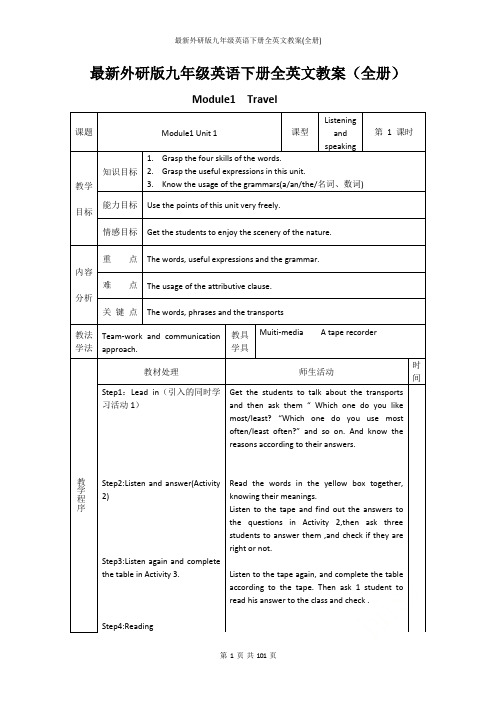
最新外研版九年级英语下册全英文教案(全册)Module1 Travel课时备课表(教案)课时备课表(教案)课时备课表(教案)课时备课表(教案)Module2 EducationModule 3 Now and thenModule4Module 4课时备课(教案)Module 5 Rules and suggestionsUnit 1 You must keep to the path.Teaching aims and demands:1.To enable the students to listen carefully and understand the dialogue2.To enable the students to master the useful expressions and everyday English. Important points and difficult points: Listening and speakingTeaching method:1. Discussion in groups2.To create an active and relax atmosphere for English learningTeaching aids: Tape recorder, some pictures, computer if possibleStep1 Warming-up: Look at the photo, and say what rules and advice you can give to visitors to the Great Wall. Have you ever been to the Great Wall? / What can we pay attention to? / What rules should we obey?Step 2 Sharing-task 1: Listen and read1. Book close! Listen to the tape and fill in the blank:Everyone, listen up! Before we can __________ ourselves on the Great Wall, there are a few _________ and suggestions. First, you must keep to the path. You _______ walk along the edge. Second, you have to keep together, or you might get lost. Third, when you go rock climbing, you must use ________. You have to think about personal ________.2. Listen again, and check in groups : keys: enjoy, rules, mustn’t, ropes, safety3. Open the book and ask the students to practice the dialogue in pairs or in groups. Step 3 Sharing-task 2 : complete the exercise in activity 4, then discuss in groups. (keys: b, c, a , c, a )Step 4 sharing–task 3: read silently again and finish activity 5 in groups.Step 5 sharing-task 4: answer the questions in activity 6.Step 6 Language points:1. listen up2. a few3. keep to the path4. go off on your own5. get lost6. I’m starving.7. start doing s.th 8.stop doing s.th / to do s.th stop from doing s.th9. think about10. take a look across11. lead the way12. I think that’s all.13. feel tiredStep 5 Sharing-task 5: Pronunciation and speaking. Ask the students to look at the sentence and listen. Then say the sentence aloud in group.Step 7 Homework1.Finish the exercises in exercise book2.Try to recite the dialogue3.Get familiar with the new wordsUnit 2 You mustn’t move.Teaching aims and demands:1.To enable the students to master the useful expressions2.To enable the students to improve their reading comprehension.Important points and difficult points: Reading comprehensionTeaching method1. Discussion in groupTeaching aids: Multimedia if possible, tape recorderStep 1 Revision1.Have a dictation and check homework.2.Make sentences with the useful expressions.Step 2 Sharing-task 1: ask the students to look at the picture and answer the questions in groups.Step 3 Sharing-task 2: Complete the passage with the given first letter.On our first day trip, all of us felt t_____1______ and soon fell asleep at night. In the mid-night, there was a strange n___2____ outside. I went out, but there was n____3____. In the morning, we f___4____ the bag of food was open. We thought there were bears. We d____5____ to hang the food in a tree. During the night the bears c___6_____ back. This time they took the food from the tree. The next day, I went for a walk in the f___7____. Unluckily, I saw a bear. I stood very s____8____. I was so frightened that I didn’t even turn my h___9___. I have never r__10___ so fast, back to my friends.(keys: tired, noise, nothing, found, decided, came, forest, still, head, run)Step 4 Sharing-task 3 Book open.Read the passage silently and finish activity 3. Check answers in groups. (Keys: b, d, d, a, a)Step 5 Sharing-task 4 Read again in details and answer the questions in activity 2. Step 6 Language points1.fall asleep2.in the middle of …3.noise – voice – soundmake lots of noise4.hang … in the tree5.not high enough6.pick up7.from a distance8.tidy up9.above all10.see s.b doing / do s.th11.reach out12.run past s.b13.my blood went cold.Step 7 Sharing-task 5 Summary: write notes about the things you must do if there are bears near.Step 8 Sharing-task 6 Writing: Discuss in group and think of an area of countryside near you. Make notes about it.Step 9 Homework1.Prepare for the words dictation.2.Finish the exercises in the exercise book.Unit 3 Language in useTeaching aims and demands:1.To enable the students to improve their writing.2.To enable the students to use the words and expressions freely.Teaching method: Modal VerbsTeaching aids: Multimedia if possible, tape recorderStep 1 Revision1.Have a dictation,2.Check the exercisesStep 2 Sharing-task 1 Read the sentences in language practice and teach Modal verbsStep 3Sharing-task 21) Work in pairs in activity 1.2) More details in the exercise book(创新学习).Step 4 Do exercises in workbook P112:1)Choose the correct answer(Part 2).2)Rewrite the underlined parts of the sentences.(Part 3)3)Read the rules about gymnastics classes and complete the sentences.(Part 4) Step 5 Around the world: Eco-tourismStep 6 Module task: writing advice for visitors to China.Step 7 Homework1.Finish all the exercises in 创新学习.2.Prepare for a test.Check all the exercises (two periods)Have a test. (one period) 教学后记:Module6。
外研版九年级英语下册全册教案
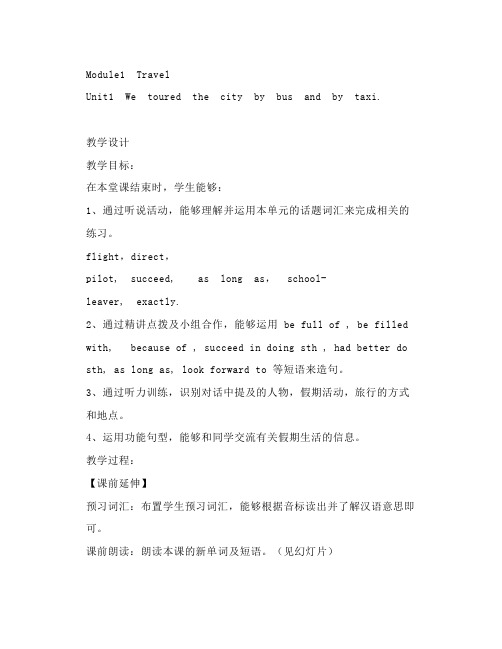
Module1 TravelUnit1 We toured the city by bus and by taxi.教学设计教学目标:在本堂课结束时,学生能够:1、通过听说活动,能够理解并运用本单元的话题词汇来完成相关的练习。
flight,direct,pilot, succeed, as long as,school-leaver, exactly.2、通过精讲点拨及小组合作,能够运用 be full of , be filled with, because of , succeed in doing sth , had better do sth, as long as, look forward to 等短语来造句。
3、通过听力训练,识别对话中提及的人物,假期活动,旅行的方式和地点。
4、运用功能句型,能够和同学交流有关假期生活的信息。
教学过程:【课前延伸】预习词汇:布置学生预习词汇,能够根据音标读出并了解汉语意思即可。
课前朗读:朗读本课的新单词及短语。
(见幻灯片)(设计意图:在课前安排学生进行新单词的朗读活动,目的是让学生进一步熟悉词汇,为课上的听说活动扫清障碍,并尽快组织好课堂。
)【课内探究】Step 1: Lead-in:展示自己在北京旅游时在天安门前拍的照片,及长城、故宫、颐和园等旅游景点及出租车、公交车的图片来导入本节课的学习。
(设计意图:用自己的照片及旅游景点的图片来导入新课,容易激发学生的学习兴趣,调动学生学习的积极性。
)Step 2: Pre-listening:(设计意图:在描述旅游经历时,最常见的信息就是乘坐了哪些交通工具,所以本活动结合交通工具图片,以师生问答的形式来谈论同学们最喜欢和最不喜欢乘坐的交通工具,为下面的对话内容做了很好的铺垫)Step 3: While-listeningTask 1: Listen and choose the correct answers.1. How long did Lingling stand>A. Over 2 hours. B . Over 3 hours. C. Over 4 hours.( ) 2. Why is travel so difficult in winter?A. Because of the weather.B. Because of t he people.C. Because of the Spring Festival.( ) 3. What are Daming and Betty looking forw ard to at the end of the term?A. The school-leavers’party.B. The school-leavers’concert.C. The school-leaver s’exam.( ) 4. When do you think the conversation tak es place?A. At the end of the term.B. At the middle of the term.C. At the beginning of the term.Say some sentences with the help of the table. Eg: Lingling went to see her grandparents in Henan Province by train.(设计意图:一听为选择题,比较简单,让学生从整体上感知对话信息,了解对话大意。
外研版初中九年级英语下册全册教案
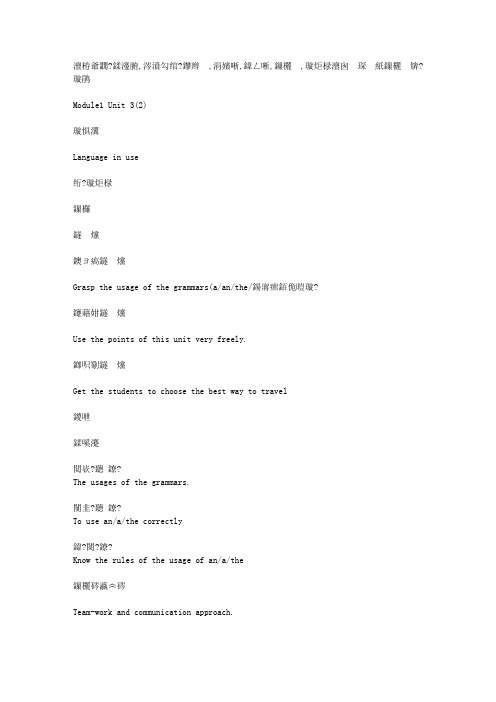
澶栫爺鐗?鍒濅腑,涔濆勾绾?鑻辫,涓嬪唽,鍏ㄥ唽,鏁欐,璇炬椂澶囪琛紙鏁欐锛? 璇鹃Module1 Unit 3(2)璇惧瀷Language in use绗?璇炬椂鏁欏鐩爣鐭ヨ瘑鐩爣Grasp the usage of the grammars(a/an/the/鍚嶈瘝銆佹暟璇?鑳藉姏鐩爣Use the points of this unit very freely.鎯呮劅鐩爣Get the students to choose the best way to travel鍐呭鍒嗘瀽閲嵚?聽鐐?The usages of the grammars.闅韭?聽鐐?To use an/a/the correctly鍏?閿?鐐?Know the rules of the usage of an/a/the鏁欐硶瀛︽硶Team-work and communication approach.鏁欏叿瀛﹀叿Muiti-media聽聽 A tape recorder鏁欏绋嬪簭鏁欐潗澶勭悊甯堢敓娲诲姩鏃堕棿Step1锛欻ave a dictationStep2:ReadingStep3: 璁茶В銆婁腑鍗庝竴棰樸€嬩腑鐨勯敊棰?Step6:Homework for today璇曢涓€浠?Get the students to write the following useful expressions:In time / on timeThe Great WallFly-flew-flownBe bad forDo harm toAt the end ofToo鈥o..Around the world:The first plane to fly across the Atlantic OceanGet the students to read this passage, before reading, teach the following: Eventually=at last=in the end=finallyFreezing 涓ュ瘨鐨?Take off 璧烽Then ask a few students to read it ,and translate it into Chinese聽 at last.Solve the problems which the students met in reading.鏁欏笀璁诧紝瀛︾敓鍏堝湪涔︿笂鏀归敊锛岀劧鍚庡啀鎶婇敊璇敼鍦ㄤ綔涓氭湰涓娿€傛敼鐨勫悓鏃讹紝鏈変笉鏄庣櫧鐨勶紝璇峰強鏃堕棶鑰佸笀銆?鏉夸功璁捐銆婁腑鍗庝竴棰樸€嬩腑鐨勯敊棰?閿欑殑鍗曡瘝閿欑殑鐭鍑虹幇鐨勬瘮杈冮噸瑕佺殑鍙ュ瀷绛夌瓑鏁欏鍚庤Module2聽 Education鏃ユ湡鏁欏鐩爣1. To grasp the words and expressions such as geography,physical,,neither,present,absent,speech.鈥nd so on.2. To listen to the dialogue about 鈥淪chools鈥?3. To talk about the life in school and compare different schools.4. To read the articles and grasp the main idea and identify the facts and views with the reading skills.5. To describe the life in school.閲嶇偣闅剧偣1. The words and the expressions.2. Talking about or writing something about Summer in LA.use of prouns.涓昏鍐呭鍙婂垎鏋?鏈ā鍧楃殑涓績璇濋鏄€滄暀鑲测€濓紝鍐呭涓昏娑夊強瀛︽牎鐢熸椿銆傝瑷€鎶€鑳藉拰璇█鐭ヨ瘑涓昏涔熸槸鍥寸粫鈥滄暀鑲测€濊繖涓€涓績璇濋璁捐鐨勩€傚叾涓湪灞曞紑鍚璇诲啓鐨勫悓鏃讹紝杩樿澶嶄範浠h瘝鐨勭敤娉?鏈ā鍧楃殑鍔熻兘鏄繘琛屾瘮杈冦€?鏂规硶鍙婃墜娈?Individual, pair and group work to make every student active in class.Communicative approach;Bottom-up approach;Formal and interactive practice and task-based approach.璇炬椂鍒掑垎Unit1 (1)Unit 2(2)Unit 3(1)Revision(1)Module 2璇炬椂澶囪锛堟暀妗堬級璇鹃Unit1 It was great to see her again.璇惧瀷Listening and speaking绗?1 璇炬椂鏁欏鐩爣鐭ヨ瘑鐩爣1) To understand what the conversation is about.2) To make notes while listening.3) To ask and answer questions about a trip to some place.鑳藉姏鐩爣1锛塗o get some information from listening.2)聽 To talk about the travel plan to some place.鎯呮劅鐩爣閫氳繃浜嗚В鍏朵粬鍥藉鏆戝亣鍩硅鐝紝澶忎护钀ョ瓑鐩稿叧淇℃伅锛屾嫇灞曡閲庛€?鍐呭鍒嗘瀽閲嵚?聽鐐?1)To understand what the conversation is about.2)To grasp the words and expressions.3)To ask and answer questions about a trip to some place.闅韭?聽鐐?The subject and object agreement.鍏?閿?鐐?Key structure: The subject and object agreement.鏁欐硶瀛︽硶Interactive approach鏁欏叿瀛﹀叿Tape-recorder, computer,鏁欏绋嬪簭鏁欐潗澶勭悊甯堢敓娲诲姩鏃堕棿涓€:Warming--up:Activities 1 .(It鈥檚 ready for listening,because some new words may be in the listening dialogue.)I come out with sunglasses and shorts so that I can lead to the new lesson and learn the new words:I say to the students:Hello, you know what I鈥檒l go to do?鈥擨 will travel to USA.I am wearing sunglasses and trousers are in the accommodation is in an American鈥檚 Americans in the home are hosts and I am a that time I will do an English I鈥檒l show the new words on the read them do read the words and questions then work in asks and the other answers.A2.(Do some listening)Listen and check their answers to Activity t the answers for the whole class.浜?A 3 .(The students listen to the dialogue with the questions and know about the conversation and answer the questions at the same time they learn the key expressions.)A4.(The students can find out the details and I鈥檒l teach them to take notes.)1. Listen to the conversation and try to answer two questions.(1)Who gets the special prize?(2)What鈥檚 the prize about?Work in asks and the other answers.2. Read the conversation by themselves and try to complete the table. Check the answers.in groups of four.(1)Try to understand the meaning of the dialogue.(2)Underline the key expressions and pay attention to The subject and object agreement.(3)Do some in groups of five.鏁欏绋嬪簭鏁欐潗澶勭悊甯堢敓娲诲姩鏃堕棿涓堿5.(The students find sentences in the conversation which suggest that鈥t 鈥檚 a little difficult for I will do the first one.)A6(Answer the questions)鍥汚8 and A9I say to them:In the conversation,Lingling and Betty and Daming,鈥漎our hair looks nice!You look smart.鈥漌hat do these sentences suggest?The students may answer:They suggest that the friends want to look their best.I will go on ashing them:Got it! Can you find the sentences which suggest鈥漈ony is a little nervous鈥?...Then work in y show the correct answers.Work in paris.(one asks and the other answers)Work in pairs or in groups about what Betty,Tony,Lingling and Daming are going to do in we have more time,we鈥檒l talk about the travel plan to some place.鏉夸功璁捐Module 2 EducationUnit 1 It was great to see her again.The key language points:e to鈥?give a warm welcome to鈥?good news is鈥?鏁欏鍚庤Module2璇炬椂澶囪琛紙鏁欐锛?璇鹃Unit 2 What鈥檚 the best thing about school?璇惧瀷Reading绗?2 璇炬椂鏁欏鐩爣鐭ヨ瘑鐩爣To learn some key words and expressions.To understand where a passage comes from.鑳藉姏鐩爣To get information from the reading material about an English course.鎯呮劅鐩爣Know more about the summer training classes in other countries or camps Broaden the vision.鍐呭鍒嗘瀽閲嵚?聽鐐?To learn some key words and expressions.To get information from the reading material about an English course.闅韭?聽鐐?The subject and object agreement.鍏?閿?鐐?Key structure: The subject and object agreement.鏁欐硶瀛︽硶Bottom-up approach鏁欏叿瀛﹀叿Tape recorder and computer鏁欏绋嬪簭鏁欐潗澶勭悊甯堢敓娲诲姩鏃堕棿涓€.Warming-up/Lead-in(Activity 1 I ask them to talk about the pictures in order to active the related background 鈥檚 ready for the following reading.)I will show some pictures about Learn English in Los Angeles and talk about in pairs.I may ask the following questions like this:can you see in Picture 1?do you think they are doing?do students live with American families?visiting Disneyland a part of English course programme?Do you think it is necessary?浜孉ctivity 2鈥擜ctivity 3(The students will choose source of the article and the students will get the rich language information,enrich the knowledge,broaden the vision and develop the thinking ability through reading and the activity.)(1) The students will read it as quickly as they can and choose the best finish Activity 3.(2) The studnts will read it again as carefully as they can聽 finish the additional exercise.(3) Listen to the tape and read it and learn the important phrases and pay attention to the subject and object agreement.(the students will learn some useful expressions by reading it and by listening to it.)The useful expressions are:(1) Summer English courses(2) Learn about(3) At the same time(4) At the beginning of鈥?(5) Weekly tests(6) As well well(7) Take part in鈥?(8) Have meals with鈥?(9) Create friendships with鈥?(10) Take place(11) 鈥?鏁欏绋嬪簭鏁欐潗澶勭悊甯堢敓娲诲姩鏃堕棿Activity 4(It鈥檚 an open students may complete the ask and answer exercise through reading or the background knowledge they should show their ideas freely.)。
外研版英语九年级下册教案

外研版英语九年级下册教案外研版英语九年级下册教案一、课程介绍本课程针对九年级下学期英语学科的学习,旨在帮助学生掌握基本的英语词汇、语法和语言表达技能,同时培养学生听说读写各方面的语言应用能力。
本课程将按照外研版教材的编排,共分为12个单元,每个单元包含主题介绍、听力、口语、阅读、语法、写作等环节,以全面提高学生的英语综合素质。
二、教学目标1、掌握基本英语词汇,能够熟练运用常用单词和短语进行表达。
2、掌握基本语法规则,能够正确使用时态、语态和句型。
3、提高听说能力,能够听懂简单的英语对话和短文,并能够用英语进行日常交流。
4、提高阅读能力,能够阅读简单的英语材料,并能够理解其中基本的意思和信息。
5、提高写作能力,能够书写简单的英语短文,并能够根据要求进行书面表达。
三、教学内容及方法1、教学内容:本课程将按照教材的编排,共分为12个单元,每个单元包含主题介绍、听力、口语、阅读、语法、写作等环节。
2、教学重点:本课程的重点是帮助学生掌握基本的英语词汇、语法和语言表达技能,同时培养学生的听说读写各方面的语言应用能力。
3、教学难点:本课程的教学难点在于帮助学生理解复杂的英语语法和语言表达方式,以及提高学生的听说能力。
4、教学方法:本课程将采用多种教学方法,包括课堂讲解、小组讨论、课堂活动、实例分析等,以激发学生的学习兴趣和积极性。
四、教学评估1、评估方法:本课程的评估方法将包括课堂表现、作业、小组讨论、单元测试和期末考试等方面。
2、评估目的:通过评估,了解学生的学习情况,及时发现并解决问题,提高学生的学习效果和成绩。
五、教学资源1、教学教材:外研版英语九年级下册教材。
2、教学工具:PPT、板书、教学视频等。
3、教学软件:语言学习软件、在线词典等。
4、教学辅导材料:课外阅读材料、练习册等。
六、教学反思1、反思教学内容:根据学生的学习反馈,对教学内容进行反思和调整,使教学内容更加符合学生的学习需求。
2、反思教学方法:根据学生的学习反馈,对教学方法进行反思和改进,使教学方法更加适应学生的学习方式。
2024-2024学年春季学期外研版初中九年级英语下册全册教案

2024-2024学年春季学期外研版初中九年级英语下册全册教案一、教学目标本册英语教材旨在通过生动有趣的教学内容,激发学生的学习兴趣,提高他们的英语素养,为他们的未来学习和生活打下坚实基础。
具体教学目标如下:1.词汇:掌握本册书中的核心词汇,并能熟练运用到实际情景中。
2.语法:掌握基本的英语语法知识,如时态、语态、句型结构等。
3.听力:提高学生的听力水平,能够听懂日常生活中的英语对话和简单的故事。
4.口语:培养学生的口语表达能力,能够用英语进行简单的交流。
5.阅读:提高学生的阅读理解能力,能够理解并分析文章的主旨和细节。
6.写作:培养学生的写作能力,能够用英语书写简单的段落和文章。
二、教学内容及安排1.Unit1:PersonalInformation(个人信息)2.Unit2:SchoolLife(校园生活)3.Unit3:HobbiesandInterests(爱好与兴趣)4.Unit4:HealthandFitness(健康与运动)5.Unit5:Travel(旅行)6.Unit6:FoodandDrink(饮食)7.Unit7:FestivalsandCelebrations(节日与庆典)8.Unit8:Technology(科技)9.Unit9:Nature(自然)10.Unit10:Animals(动物)11.Unit11:Sports(运动)12.Unit12:Environment(环境)13.Unit13:Music(音乐)14.Unit14:Education(教育)15.Unit15:FuturePlans(未来计划)1.Unit1:2课时2.Unit2:2课时3.Unit3:2课时4.Unit4:2课时5.Unit5:2课时6.Unit6:2课时7.Unit7:2课时8.Unit8:2课时9.Unit9:2课时10.Unit10:2课时11.Unit11:2课时12.Unit12:2课时13.Unit13:2课时14.Unit14:2课时15.Unit15:2课时三、教学策略及方法1.词汇教学:采用图片、实物、情景创设等方法,让学生在真实语境中学习词汇,提高记忆效果。
外研版英语(新标准)九年级下册教案(全册)

Step3:
Scan the text and choose the proper answers. 查读课文:
本活动旨在检测 学生对文章细节的理
个体活动,学生快速扫描式阅读文章,选择答案;
解能力。鼓励并引导
全班核对答案,请学生指出文中支持所选答案的句子。
学生合作学习。不仅
懂得答案,还要掌握
阅读技巧。
教学过程
第一课时教学设计
教材
课型:听说课
分析
内容是描述假期经历。在描述旅行经历时,让学生讨论自己喜欢的和不喜欢的 旅行工具,既为将要学习的对话做好了铺垫,也复习了八年级上册第四模块的内
容。本活动起到承上启下的作用。在听力部分,要求学生记录航班信息,这是非
常实用的技巧,能帮助学生提升处理实际问题的能力。
Homework : 作业 1:背诵所学的单词和短语; 作业 2:写一篇假期游记,内容包括:你去了哪儿,你 做过什么,旅途中发生了什么等。
力。循序渐进,帮助学 生在不同的语境中恰当 自如地运用语言。
本活动旨在拓展学 生的思维,鼓励学生充 分运用所学的知识及技 能讨论本文的主题 --旅行,进一步培养学生 的口头表达能力。
型,要求学生准确地模
2. 听并跟读整篇对话。
仿其语音语调;
3. 分角色表演对话。
2. 跟读句型全文,以获
得对整篇对话的整体
感;
3. 分角色模仿,旨在培
养学生的听说能力及创
新能力。
Useful expressions: 归纳总结本课的重要词汇。
通过归纳对话中的 重点词汇,让教学做到
学生根据所给汉语说出英语词组。
点面结合,学生对词汇
齐声朗读英文词汇两遍。
及全文的理解会更深
外研版初中九年级英语下册全册教案:学习策略与习惯建立

外研版初中九年级英语下册全册教案:学习策略与习惯建立学习策略与习惯建立是英语学习中非常重要的一环。
掌握好学习策略和建立好学习习惯,不仅可以帮助我们更有效地学习英语,还可能成为我们成功与否的关键。
在这本外研版初中九年级英语下册全册教案中,我们将如何学习英语策略以及如何建立好的习惯呢?下面让我们一起来探讨一下。
一、学习策略1.提高听力及口语能力的策略① 听力练习:要想提高听力能力,最重要的是进行大量的听力练习。
可以选择一些在线的英语听力材料进行练习,还可以听一些英语广播、英语歌曲、英语电影等进行听力练习。
② 口语练习:要想提高口语能力,最好的方法就是多说多练。
可以通过口语课程、与外教沟通、与同学练习等方式来提高自己的口语能力。
2.掌握阅读及写作的策略① 阅读练习:要想提高阅读能力,可以多读一些英语材料,比如英文小说、英文报纸、英文电影评论等。
在阅读时,可以使用一些有帮助的工具来帮助理解,比如字典、翻译软件等。
② 写作练习:要想提高写作能力,可以先学习一些常用的句型和单词,并且多练习模仿一些好的句子和文章。
也可以在书写的过程中,使用一些辅助工具来帮助自己,比如语法检查软件、写作工具等。
3.合理规划学习时间当我们开始学习英语时,最关键的一点就是要制定一个好的学习计划。
这个计划应该考虑到自己的空闲时间和能力水平,并且需要合理地分配时间,充分利用自己的时间来学习英语。
二、学习习惯1.坚持每天学习学习英语不能一蹴而就,而是需要坚持每天学习。
可以在规定的时间段内进行学习,或者在每天的闲暇时间中进行学习。
这样做既可以提高效率,又可以巩固所学知识。
2.创造良好的学习环境在学习英语的过程中,我们需要创造一个适合自己的学习环境。
可以在家中或学校中,划分一个专门的学习区域,以便更好地专注于英语学习。
还可以保持房间清洁整洁,让学习的环境更加舒适。
3.多看英语、多听英语、多说英语在学习英语的过程中,我们要努力提高自己的听说能力。
外研社九年级下学期英语教学教案(精)

外研社九年级下学期英语教学教案(精)教学目标:- 建立良好的听说读写能力- 提高学生的阅读理解和写作水平- 培养学生的自主研究能力和合作意识教学内容:1. Unit 1: Stranger in the city- 词汇:城市生活相关词汇,如建筑、交通工具等- 语法:现在进行时的用法和句型转换- 阅读:阅读关于城市生活的文章,研究提取信息和推理判断的技巧- 写作:描述城市生活,写一篇有关城市游览的短文2. Unit 2: Famous for what?- 词汇:描述地方特色的词汇,如风景、历史、文化等- 语法:被动语态的用法和句型转换- 阅读:阅读关于著名景点和名人的文章,研究理解并提取关键信息- 写作:描述一个自己熟悉的地方,并介绍该地方的特色和名人3. Unit 3: Who's the best actor?- 词汇:电影、演员、表演等相关词汇- 语法:比较级和最高级的用法和句型转换- 阅读:阅读关于电影和演员的文章,研究提取信息和进行观点表达- 写作:写一篇关于自己喜欢的电影或演员的评论教学活动:1. 听力训练:通过听录音和针对性的听力练,提高学生的听力理解能力。
2. 口语练:以对话和角色扮演的形式,培养学生的口语表达能力和交流能力。
3. 阅读训练:通过阅读文章,研究关键信息的提取和理解技巧。
4. 写作训练:以不同的写作任务,培养学生的写作能力和表达能力。
5. 小组合作:通过小组活动和合作项目,培养学生的团队合作意识和互动能力。
评估方法:1. 听力测试:考察学生的听力理解能力。
2. 口语表达:通过口头答题和对话,评估学生的口语表达能力。
3. 阅读理解:通过阅读理解题目,评估学生的阅读理解能力。
4. 写作能力:评估学生在写作任务中的表达能力和语法正确性。
5. 课堂参与:评估学生在课堂中的积极参与和合作精神。
教学资源:1. 教材:外研社九年级下学期英语教材2. 多媒体设备:投影仪、音频设备等3. 教具:练册、图片、模型等教学时间安排:根据课程内容和学生的研究进度,进行合理的教学时间安排。
外研版-九年级下全册教案
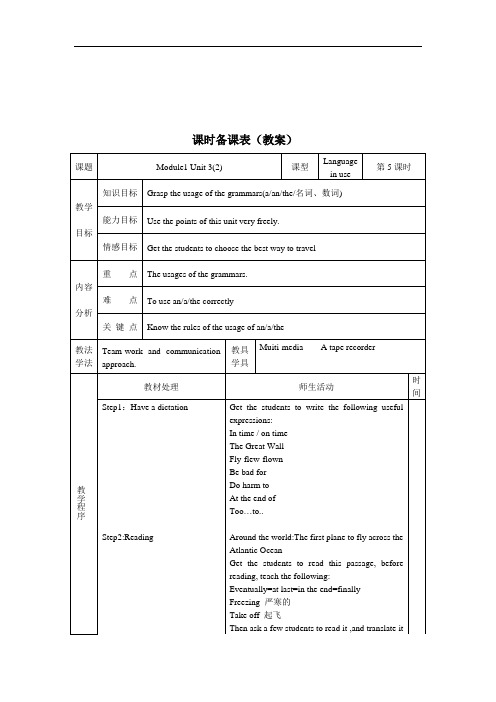
课时备课表(教案)Module2 EducationModule 2课时备课(教案)序Module2课时备课表(教案)Module 2 课时备课表(教案)Module2 课时备课表(教案)Module 2课时备课表(教案)Module 3 Now and thenModule 4 Rules and suggestionsUnit 1Teaching aims and demands:1.To enable the students to listen carefully and understand the dialogue2.To enable the students to master the useful expressions and everyday English. Important points and difficult points: Listening and speakingTeaching method:1. Discussion in groups2.To create an active and relax atmosphere for English learningTeaching aids: Tape recorder, some pictures, computer if possibleStep1 Warming-up: Look at the photo, and say what rules and advice you can give to visitors to the Great Wall. Have you ever been to the Great Wall? / What can we pay attention to? / What rules should we obey?Step 2 Sharing-task 1: Listen and read1. Book close! Listen to the tape and fill in the blank:Everyone, listen up! Before we can __________ ourselves on the Great Wall, there are a few _________ and suggestions. First, you must keep to the path. You _______ walk along the edge. Second, you have to keep together, or you might get lost. Third, when you go rock climbing, you must use ________. Youhave to think about personal ________.2. Listen again, and check in groups : keys: enjoy, rules, mustn’t, ropes, safety3. Open the book and ask the students to practice the dialogue in pairs or in groups. Step 3 Sharing-task 2 : complete the exercise in activity 4, then discuss in groups. (keys: b, c, a , c, a )Step 4 sharing–task 3: read silently again and finish activity 5 in groups.Step 5 sharing-task 4: answer the questions in activity 6.Step 6 Language points:1. listen up2. a few3. keep to the path4. go off on your own5. get lost6. I’m starving.7. start doing s.th 8.stop doing s.th / to do s.th stop from doing s.th9. think about10. take a look across11. lead the way12. I think that’s all.13. feel tiredStep 5 Sharing-task 5: Pronunciation and speaking. Ask the students to look at the sentence and listen. Then say the sentence aloud in group.Step 7 Homework1.Finish the exercises in exercise book2.Try to recite the dialogue3.Get familiar with the new wordsUnit 2Teaching aims and demands:1.To enable the students to master the useful expressions2.To enable the students to improve their reading comprehension.Important points and difficult points: Reading comprehensionTeaching method1. Discussion in groupTeaching aids: Multimedia if possible, tape recorderStep 1 Revision1.Have a dictation and check homework.2.Make sentences with the useful expressions.Step 2 Sharing-task 1: ask the students to look at the picture and answer the questions in groups.Step 3 Sharing-task 2: Complete the passage with the given first letter.On our first day trip, all of us felt t_____1______ and soon fell asleep at night. In the mid-night, there was a strange n___2____ outside. I went out, but there was n____3____. In the morning, we f___4____ the bag of food was open. We thought there were bears. We d____5____ to hang the food in a tree. During the night the bears c___6_____ back. This time they took the food from the tree. The next day, I went for a walk in the f___7____. Unluckily, I saw a bear. I stood very s____8____. I was so frightened that I didn’t even turn my h___9___. I have never r__10___ so fast, back to my friends.(keys: tired, noise, nothing, found, decided, came, forest, still, head, run)Step 4 Sharing-task 3 Book open.Read the passage silently and finish activity 3. Check answers in groups. (Keys: b, d, d, a, a)Step 5 Sharing-task 4 Read again in details and answer the questions in activity 2. Step 6 Language points1.fall asleep2.in the middle of …3.noise – voice – soundmake lots of noise4.hang … in the tree5.not high enough6.pick up7.from a distance8.tidy up9.above all10.see s.b doing / do s.th11.reach out12.run past s.b13.my blood went cold.Step 7 Sharing-task 5 Summary: write notes about the things you must do if there are bears near.Step 8 Sharing-task 6 Writing: Discuss in group and think of an area of countryside near you. Make notes about it.Step 9 Homework1.Prepare for the words dictation.2.Finish the exercises in the exercise book.Unit 3 Language in useTeaching aims and demands:1.To enable the students to improve their writing.2.To enable the students to use the words and expressions freely.Teaching method: Modal VerbsTeaching aids: Multimedia if possible, tape recorderStep 1 Revision1.Have a dictation,2.Check the exercisesStep 2 Sharing-task 1 Read the sentences in language practice and teach Modal verbsStep 3Sharing-task 21) Work in pairs in activity 1.2) More details in the exercise book(创新学习).Step 4 Do exercises in workbook P112:1)Choose the correct answer(Part 2).2)Rewrite the underlined parts of the sentences.(Part 3)3)Read the rules about gymnastics classes and complete the sentences.(Part 4)Step 5 Around the world: Eco-tourismStep 6 Module task: writing advice for visitors to China.Step 7 Homework1.Finish all the exercises in 创新学习.2.Prepare for a test.Check all the exercises (two periods)Have a test. (one period) 教学后记:Module5Module 5课时备课(教案)Module 5课时备课表(教案)Module6 课时备课表(教案)Module5 课时备课表(教案)Module 5课时备课表(教案)外研初三下册MODULE 6Content:Module 6 Eating together一、题材内容本模块以食物和饮食习惯为话题。
2023-2024学年外研版九年级英语下册课程教案
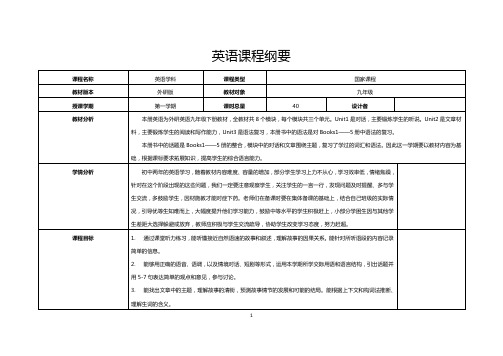
英语课程纲要课程名称英语学科课程类型国家课程教材版本外研版教材对象九年级授课学期第一学期课时总量40 设计者教材分析本册英语为外研英语九年级下册教材,全教材共8个模块,每个模块共三个单元。
Unit1是对话,主要锻炼学生的听说。
Unit2是文章材料,主要锻炼学生的阅读和写作能力,Unit3是语法复习,本册书中的语法是对Books1——5册中语法的复习。
本册书中的话题是Books1——5册的整合,模块中的对话和文章围绕主题,复习了学过的词汇和语法。
因此这一学期要以教材内容为基础,根据课标要求拓展知识,提高学生的综合语言能力。
学情分析初中两年的英语学习,随着教材内容难度、容量的增加,部分学生学习上力不从心,学习效率低,情绪焦躁,针对在这个阶段出现的这些问题,我们一定要注意观察学生,关注学生的一言一行,发现问题及时提醒、多与学生交流,多鼓励学生,因材施教才能对症下药。
老师们在备课时要在集体备课的基础上,结合自己班级的实际情况,引导优等生知难而上,大幅度提升他们学习能力,鼓励中等水平的学生积极赶上,小部分学困生因与其他学生差距大选择躲避或放弃,教师应积极与学生交流疏导,协助学生改变学习态度,努力赶超。
课程目标 1. 通过课堂听力练习,能听懂接近自然语速的故事和叙述,理解故事的因果关系。
能针对所听语段的内容记录简单的信息。
2. 能够用正确的语音、语调,以及情境对话、短剧等形式,运用本学期所学交际用语和语言结构,引出话题并用5-7句表达简单的观点和意见,参与讨论。
3. 能找出文章中的主题,理解故事的清街,预测故事情节的发展和可能的结局。
能根据上下文和构词法推断、理解生词的含义。
14. 能根据写作要求,收集、准备素材。
能独立起草短文、短信等,并在教师指导下进行修改。
能根据图示或表格写出简单的段落或操作说明。
5. 有较明确的英语学习动机、积极主动的学习态度和自信心。
能与他人合作,解决问题并报告结果,共同完成学习任务。
- 1、下载文档前请自行甄别文档内容的完整性,平台不提供额外的编辑、内容补充、找答案等附加服务。
- 2、"仅部分预览"的文档,不可在线预览部分如存在完整性等问题,可反馈申请退款(可完整预览的文档不适用该条件!)。
- 3、如文档侵犯您的权益,请联系客服反馈,我们会尽快为您处理(人工客服工作时间:9:00-18:30)。
A. 能理解关于学校及学校生活的对话。
B. 能比较不同的学校。
3. 情感目标:
培养竞争和合作精神。
教学重点与难点3.重点:
A.能理解关于学校生活的对话。
B.能学会描述个人的学校生活。
4.难点: 能与朋友或同学交流关于学校生活的话题。
教学辅
助
多媒体,投影仪,收录机,图片
教学策
略
交际法、自下而上教学法
教学内容教学活动设计意图
教师活动学生活动
Step 1: 导入:
3.让学生讨论关于学校的各种信息;
4.教师让学生运用词汇描绘学校,鼓励2-4对学生在
班上分享自己的看法。
Talk about school. What do you think of to describe
“school”?
可以点击课件中的超链接,可讨论校园、校服、教室安排等内容。
采用“头脑风暴”方式讨论旅行方式,很容易激发起学生们的学习兴趣,并能自然而然地引出本节课所学内容。
在几个重要的词汇,如campus, school uniform, classroom等,还设计了超链接,点击这些词汇,可以让同学们看到中
《英语》(新标准)(初中阶段)九年级下册M4教学设计
《英语》(新标准)九年级下册Revision Module A 教学设计。
